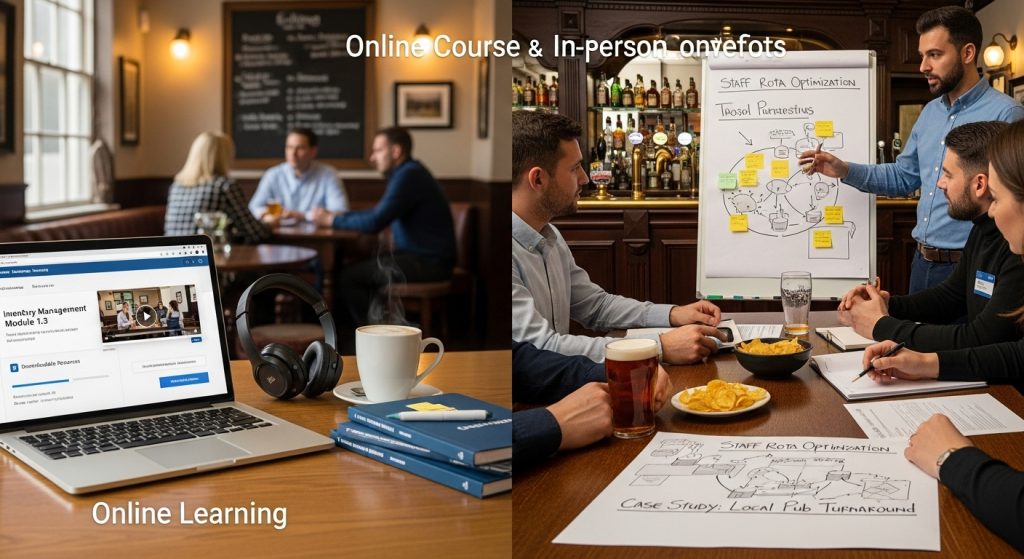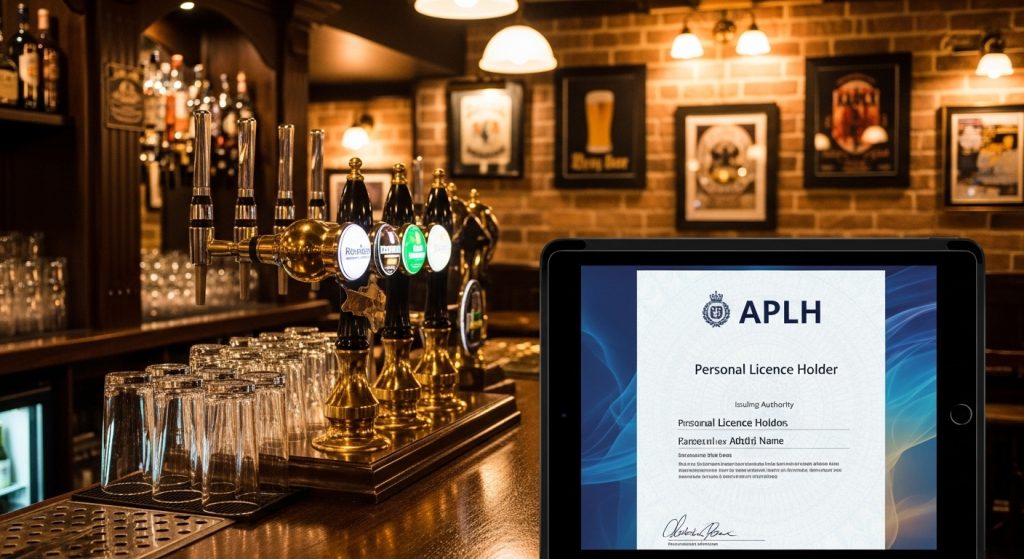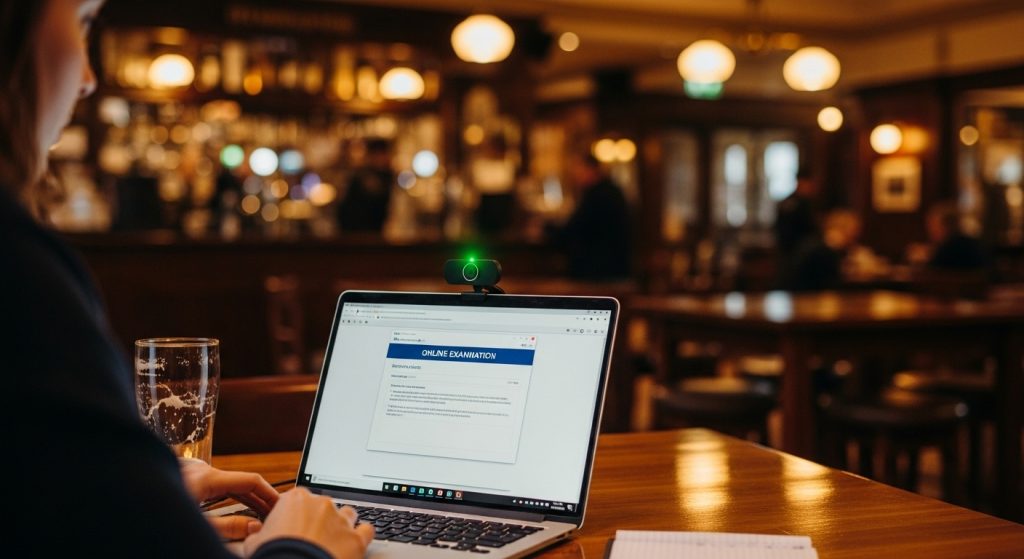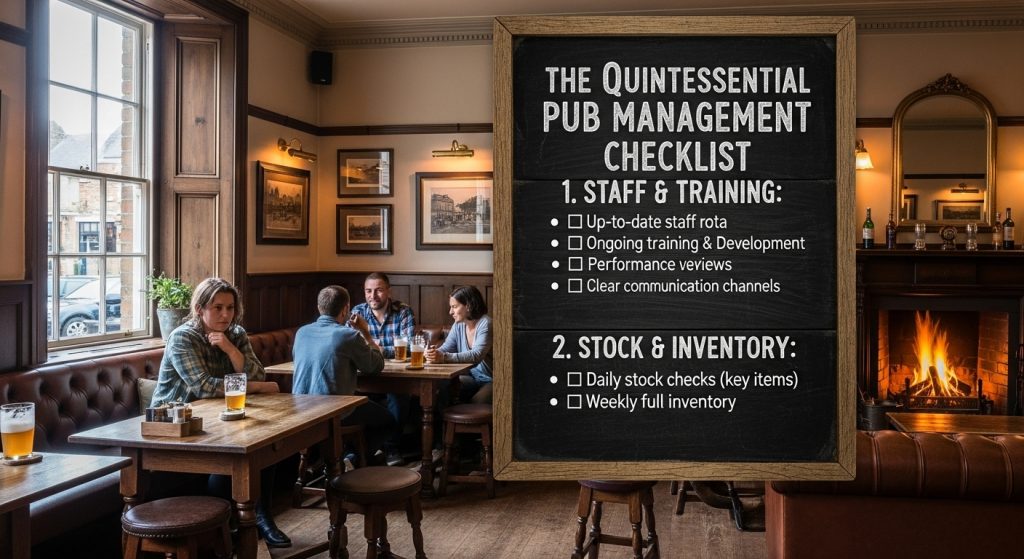APLH Personal Licence Pub Management Online Learning UK Licensing Hospitality Training Landlord Resources SmartPubTools

Strategy & Assets
ArticleGrowth PlanMonetization & SEOImage PlanCopy HTML
Master Your Pub’s Future: How to Book Your APLH Personal Licence Course Online in the UK
Stepping into the role of a pub landlord or manager in the UK is an exciting venture, but it comes with significant responsibilities, particularly when it comes to the sale of alcohol. At the heart of this responsibility lies the Personal Licence, and to obtain it, you first need to secure the Award for Personal Licence Holders (APLH) qualification. Navigating the training and application process can feel daunting, especially with the demanding schedule of running a pub. But what if we told you there’s a flexible, efficient, and increasingly popular way to achieve this? Booking your APLH course online is rapidly becoming the preferred choice for busy UK pub professionals.
This comprehensive guide will walk you through everything you need to know about booking your APLH course online, from choosing the right provider to acing the exam and finally securing your Personal Licence. We’ll demystify the process, highlight the benefits, and equip you with the knowledge to make an informed decision, ensuring you’re fully compliant and confident in your role. Don’t forget to grab our free ‘Ultimate Personal Licence Application Checklist’ at SmartPubTools.net/freebies to kickstart your journey!
TL;DR: Key Takeaways for Busy Landlords
- The APLH qualification is legally required to obtain a Personal Licence, essential for selling alcohol in UK pubs.
- Online APLH courses offer unparalleled flexibility, convenience, and cost-effectiveness compared to traditional classroom training.
- Choose accredited providers (Highfield, BIIAB, Ofqual regulated) with strong reputations and clear exam procedures.
- The booking process is straightforward: register, pay, access materials, and prepare for a remotely invigilated online exam.
- After passing, apply to your local council with your APLH certificate, a recent DBS check, and form LIC1.
- Avoid common pitfalls like unaccredited courses, DBS delays, and incorrect application forms to ensure a smooth journey.
Table of Contents
- Understanding the APLH and Your Personal Licence: Why It’s Crucial for UK Pubs
- The Unbeatable Benefits of Booking Your APLH Course Online
- Choosing the Right Online APLH Course Provider: What to Look For
- Step-by-Step: Booking Your APLH Course Online with Confidence
- Navigating Your Online APLH Learning Journey and Acing the Exam
- Beyond the Course: Applying for Your Personal Licence with Your Local Authority
- Common Pitfalls and How to Avoid Them When Securing Your Personal Licence
- Maximising Your Investment: How a Personal Licence Elevates Your Pub Business
- The ‘King’s Head’ & The Digital Leap: A Case Study in Online APLH Success
- Your Personal Licence Application Success Checklist
- Key Facts About Your APLH & Personal Licence
- Frequently Asked Questions (FAQs)
- Conclusion: Your Pub’s Future, Secured Online
Understanding the APLH and Your Personal Licence: Why It’s Crucial for UK Pubs
For anyone involved in the sale of alcohol in England and Wales, understanding the legal framework is not just good practice – it’s a legal imperative. At the core of this framework is the Personal Licence, a crucial document that authorises individuals to sell or supply alcohol in accordance with a premises licence. To obtain this, you must first achieve the Award for Personal Licence Holders (APLH) qualification. Think of the APLH as your foundational training, proving you have the essential knowledge to operate responsibly and legally.
What Exactly is the APLH?
The APLH is a Level 2 qualification regulated by Ofqual (The Office of Qualifications and Examinations Regulation). It covers key areas of the Licensing Act 2003, ensuring that licence holders are fully aware of their legal obligations and the broader implications of alcohol sales. Topics typically include:
- The Licensing Act 2003: Its core objectives (prevention of crime and disorder, public safety, prevention of public nuisance, protection of children from harm).
- The Role of Licensing Authorities: Understanding local councils’ powers and responsibilities.
- Personal Licences: Who needs one, how to apply, and the conditions attached.
- Premises Licences: How they operate, conditions, and variations.
- Responsible Retail of Alcohol: Age verification, refusal of sale, prevention of drunkenness.
- Police Powers: Stop and search, closure orders.
- Social Responsibility: Understanding the impact of alcohol on health and society.
Passing the APLH exam demonstrates your competence and commitment to upholding the law, making you eligible to apply for your Personal Licence.
Why is a Personal Licence Crucial for Your Pub?
A Personal Licence is more than just a piece of paper; it’s a cornerstone of legal and ethical pub operation. Here’s why it’s indispensable:
- Legal Requirement: In England and Wales, every premise that sells alcohol must have a Designated Premises Supervisor (DPS) who holds a Personal Licence. While not every staff member needs one, having multiple Personal Licence holders on your team offers flexibility and ensures continuity.
- Authorisation to Sell: Without a Personal Licence, you cannot authorise the sale of alcohol. This means you cannot be a DPS, and your pub cannot operate legally.
- Flexibility and Cover: If your DPS is ill or on holiday, another Personal Licence holder can step in without disruption to your business. This is vital for maintaining smooth operations and avoiding costly closures.
- Professional Development: Obtaining an APLH and Personal Licence demonstrates your professionalism and dedication to responsible alcohol retailing. It enhances your credibility with licensing authorities, local police, and your community.
- Risk Mitigation: A thorough understanding of licensing laws helps you avoid breaches that could lead to fines, licence reviews, or even the revocation of your premises licence – a catastrophic outcome for any pub.
In essence, the APLH and subsequent Personal Licence are fundamental to the legal, safe, and profitable operation of your UK pub. It’s an investment in compliance, reputation, and peace of mind.
The Unbeatable Benefits of Booking Your APLH Course Online
For years, obtaining an APLH involved attending fixed-schedule classroom courses, often requiring significant time away from your pub. While traditional learning has its merits, the modern pub landlord or manager faces unique challenges – long hours, unpredictable schedules, and the constant need to be present. This is where booking your APLH course online truly shines, offering a suite of benefits that make it the superior choice for most UK hospitality professionals.

Unrivalled Flexibility and Convenience
The most compelling advantage of an online APLH course is its flexibility. You are no longer bound by rigid timetables or geographical constraints. Imagine studying late at night after the last customer leaves, during a quiet afternoon lull, or even from the comfort of your home on a rare day off. Online courses are typically self-paced, allowing you to:
- Study Anytime, Anywhere: Access course materials 24/7 from any device with an internet connection – be it a laptop, tablet, or smartphone.
- Learn at Your Own Pace: Some modules require more attention than others. Online learning allows you to spend extra time on complex topics and quickly move through areas you’re already familiar with.
- Fit Learning Around Your Life: Integrate your studies seamlessly into your demanding schedule, minimising disruption to your pub’s operations and your personal life.
Cost-Effectiveness and Time Savings
Beyond convenience, online courses often translate into tangible financial and time savings:
- Lower Course Fees: Online providers typically have lower overheads than physical training centres, which can be reflected in more competitive course prices.
- No Travel or Accommodation Costs: Eliminate expenses associated with commuting, parking, or even overnight stays for courses held in distant locations.
- Reduced Time Away from Work: Minimise the need for cover staff or lost revenue from your own absence, which can be substantial for a small business.
Accessibility and Comprehensive Resources
Online learning platforms are designed to be user-friendly and highly effective:
- Interactive Learning: Many courses incorporate videos, quizzes, interactive scenarios, and downloadable resources to enhance engagement and retention.
- Consistent Quality: Online materials are typically standardised and regularly updated, ensuring you receive the most current and accurate information.
- Support Systems: Reputable online providers offer technical support, and some even provide access to tutors for questions and guidance, mirroring the support of a classroom environment.
- Environmentally Friendly: Reduced travel and paper usage contribute to a smaller carbon footprint, aligning with modern sustainability goals.
While traditional classroom settings offer face-to-face interaction, the overwhelming benefits of online APLH courses – particularly for the time-strapped and geographically diverse UK pub community – make them an increasingly attractive and practical choice. They empower you to gain a vital qualification without sacrificing your business or your sanity.
Choosing the Right Online APLH Course Provider: What to Look For
With the rise in popularity of online APLH courses, a multitude of providers have emerged. While this offers choice, it also means you need to be discerning to ensure you select a course that is not only legitimate and accredited but also effective and supportive. Choosing wisely is paramount to a smooth learning journey and a successful outcome.

Essential Accreditation and Recognition
This is arguably the most critical factor. Your APLH certificate must be recognised by all UK licensing authorities. To ensure this, the course and its awarding body must be regulated by Ofqual. Look for providers whose courses are accredited by:
- Highfield Qualifications: One of the UK’s leading awarding organisations for vocational qualifications.
- BIIAB (British Institute of Innkeeping Awarding Body): Specifically tailored for the licensed retail sector.
Always check for the Ofqual logo and explicit statements of accreditation on the provider’s website. Without this, your certificate may not be accepted, making your efforts and investment wasted.
Reputation and Reviews: What Do Other Landlords Say?
Before committing, delve into the provider’s reputation. Look for:
- Online Reviews: Check independent review platforms like Trustpilot, Google Reviews, or even hospitality-specific forums. Pay attention to comments about course quality, support, and exam experience.
- Industry Standing: Has the provider been operating for a significant time? Are they well-regarded within the UK pub and hospitality sector?
- Success Rates: While not always published, a provider with a high pass rate for the APLH exam indicates effective teaching methods and support.
Course Content, Structure, and Learning Experience
A good online course should be more than just a digital textbook. Consider:
- Clarity and Engagement: Is the content easy to understand? Does it use a mix of text, video, and interactive elements to keep you engaged?
- Module Breakdown: Is the course logically structured into manageable modules? This helps in self-paced learning.
- Practice Tests and Resources: Does the course offer mock exams or practice questions? These are invaluable for preparing for the final assessment.
- Accessibility: Is the platform user-friendly and accessible across different devices?
Exam Format and Support
The APLH exam is a crucial hurdle. Understand how it’s administered:
- Online Invigilation: Most online courses offer remote invigilation. Understand the technical requirements (webcam, microphone, stable internet) and the rules (e.g., no talking, clear desk).
- Resit Policy: What happens if you don’t pass the first time? Are resits included in the initial fee, or do they cost extra? A fair resit policy can save you money and stress.
- Tutor and Technical Support: Can you easily reach out for help if you have questions about the course content or face technical issues during study or the exam?
Pricing and Value for Money
While cost shouldn’t be the sole deciding factor, it’s important to compare:
- All-Inclusive Pricing: Does the advertised price include the exam fee, certificate, and any digital learning materials? Some providers offer packages that include a resit.
- Hidden Costs: Are there extra charges for printing certificates, technical support, or additional study aids?
When you’re ready to compare providers and secure your spot, a great starting point for finding Highfield-accredited online APLH courses with excellent support and flexible exam options is this trusted platform. They offer a streamlined process to help you get qualified efficiently.
By thoroughly evaluating these factors, you can confidently choose an online APLH course provider that meets your needs and sets you up for success in obtaining your Personal Licence.
Step-by-Step: Booking Your APLH Course Online with Confidence
Once you’ve done your research and identified the ideal online APLH course provider, the booking process itself is typically straightforward and designed for convenience. However, knowing what to expect can help you navigate it smoothly and avoid any last-minute hitches.

Step 1: Research and Compare (Revisited)
Even if you’ve narrowed down your choices, take one final look. Visit the provider’s website, check their FAQs, and ensure all your questions about accreditation, exam process, and support are answered. Confirm their Ofqual accreditation and which awarding body (Highfield, BIIAB) they use. This due diligence ensures peace of mind.
Step 2: Registration and Account Creation
Most online APLH course providers will require you to create an account on their learning platform. This usually involves:
- Providing your full name, email address, and contact details.
- Setting up a secure password.
- Agreeing to their terms and conditions.
Ensure all details are accurate, as these will be used for your certificate and communication.
Step 3: Course Selection and Payment
Once registered, you’ll typically select the APLH Level 2 course. The website will guide you through the payment process. Common payment methods include:
- Credit/Debit Card (Visa, MasterCard, etc.)
- PayPal
- Bank Transfer (less common for individual bookings)
Double-check the total cost, ensuring it includes the course materials, online exam, and certificate. Some providers offer a ‘resit’ option as part of a premium package, which can be a valuable addition for peace of mind.
Step 4: Accessing Your Learning Materials
Immediately after successful payment, you should receive an email confirmation and gain access to your online learning portal. This portal will house:
- Course Modules: Structured lessons covering all aspects of the APLH syllabus.
- Study Guides: Downloadable PDFs, slides, or supplementary reading.
- Practice Quizzes/Tests: Essential tools to test your knowledge as you progress.
- Video Content: Explanatory videos or recorded lectures.
Familiarise yourself with the platform, ensuring you know how to navigate between modules, access support, and track your progress.
Step 5: Preparing for the Online Exam
While you might not book your exam immediately, it’s crucial to understand the requirements from the outset. Most online APLH exams are conducted via remote invigilation. This means:
- Technical Setup: You’ll need a reliable computer (laptop or desktop, usually not tablets/phones), a working webcam, microphone, and a stable internet connection.
- Environment: A quiet, private room where you won’t be disturbed, with a clear desk.
- Identity Verification: You’ll typically need to show a valid form of photo ID (e.g., passport, driving licence) to the online invigilator.
Some providers offer a system check tool to ensure your setup is compatible before your exam day. Take advantage of this. Booking your online APLH course is the first step towards securing your Personal Licence and ensuring your pub’s legal compliance. By following these steps, you can embark on your learning journey with clarity and confidence.
Navigating Your Online APLH Learning Journey and Acing the Exam
Booking your APLH course online is just the beginning; the real work lies in engaging with the material and successfully passing the exam. With the right approach, you can master the content and confidently achieve your qualification.

Effective Study Strategies for Online APLH Courses
Online learning offers flexibility, but it also requires self-discipline. Here’s how to make the most of your study time:
- Create a Study Schedule: Even with flexibility, a routine helps. Dedicate specific slots in your week for study, treating them as non-negotiable appointments. Even 30-60 minute bursts are effective.
- Break Down the Content: Don’t try to absorb everything at once. Focus on one module or topic at a time.
- Take Notes: Actively summarise key points, legal terms, and responsibilities. This aids memory retention.
- Utilise Practice Tests: Most online courses include quizzes and mock exams. Use these frequently to test your understanding, identify weak areas, and familiarise yourself with the question format.
- Engage with Interactive Elements: Don’t just skim videos or skip interactive scenarios. These are designed to reinforce learning.
- Review and Revise: Before your exam, dedicate time to a comprehensive review of all modules, focusing on areas where you struggled in practice tests.
Understanding the APLH Syllabus: Key Areas to Master
The APLH exam assesses your knowledge across several critical domains. Pay particular attention to:
- The Four Licensing Objectives: Prevention of crime and disorder, public safety, prevention of public nuisance, and protection of children from harm. Understand what each means in practice.
- Legal Definitions: Know the difference between a Personal Licence and a Premises Licence, Designated Premises Supervisor (DPS), temporary event notices (TENs), and relevant offences.
- Responsible Alcohol Sale: Age verification policies (Challenge 25/21), refusal of service to intoxicated individuals, and the consequences of illegal sales.
- Police Powers: Understand when police can enter premises, issue closure orders, or seize alcohol.
- Licensing Authority Powers: Know how local councils manage licence applications, reviews, and variations.
Focus on understanding the ‘why’ behind the laws, not just memorising facts. This contextual understanding will help you apply the knowledge in the exam and in your day-to-day pub operations.
Acing the Online Exam: Tips for Success
The online APLH exam is typically multiple-choice, but it requires careful attention to detail. Here’s how to prepare for and conquer it:
- Technical Check: A day or two before, ensure your webcam, microphone, and internet connection are working perfectly. Close all unnecessary applications on your computer.
- Quiet Environment: Choose a quiet, well-lit room where you won’t be interrupted. Clear your desk of any materials except for what’s explicitly allowed (usually nothing).
- Read Instructions Carefully: Before starting, read all instructions from the invigilator and the exam platform. Understand the time limit and navigation.
- Manage Your Time: Keep an eye on the clock. If you get stuck on a question, flag it and move on, returning to it later if time permits.
- Read Each Question Twice: Ensure you fully understand what is being asked before selecting an answer. Look out for keywords like ‘always,’ ‘never,’ ‘most,’ or ‘least.’
- Eliminate Incorrect Options: For multiple-choice questions, try to rule out clearly wrong answers first. This increases your chances of selecting the correct one.
- Stay Calm: It’s natural to feel nervous, but deep breaths can help. Trust in your preparation.
By combining effective study habits with a clear understanding of the syllabus and smart exam strategies, you’ll be well-prepared to pass your online APLH exam and move closer to securing your Personal Licence.
Streamline Your Pub Management with SmartPubTools!
While you’re mastering your APLH, why not streamline other aspects of your pub? From inventory management to staff rotas and marketing, SmartPubTools.net offers intuitive solutions designed for UK pubs.
Start your FREE 14-day trial today and discover how to save time, reduce waste, and boost your profits!
Beyond the Course: Applying for Your Personal Licence with Your Local Authority
Passing your APLH exam is a fantastic achievement, but it’s just one part of the journey to becoming a Personal Licence holder. The next crucial step is submitting a formal application to your local licensing authority (your local council). This process requires attention to detail and a clear understanding of the necessary documentation.

Gathering Your Essential Documents
Before you even touch the application form, ensure you have these critical documents ready:
- APLH Certificate: Your shiny new qualification, proving you’ve passed the required course. Keep both digital and physical copies if possible.
- Criminal Record Check (DBS Certificate): You will need an ‘Enhanced DBS Check’ or, more commonly, a ‘Basic DBS Check’ issued within the last month (some councils specify 28 days or 3 months, so check with yours). This check confirms you haven’t committed any ‘relevant offences’ or ‘foreign offences’ that would prevent you from holding a licence. You can apply for a Basic DBS check online via the Gov.uk website or through a registered body.
- Two Passport-Sized Photographs: These must be recent, clear, and meet passport photo standards. One photo needs to be endorsed by a ‘person of standing’ (e.g., solicitor, doctor, teacher) who has known you for at least two years and is not a family member. They will sign and date the back of one photo, stating ‘I certify that this is a true likeness of [Your Full Name]’.
- Proof of Right to Work in the UK: For non-UK citizens, you will need to demonstrate your right to work in the UK. This might include a share code from the Home Office.
It’s vital that all names and addresses on your documents match precisely. Any discrepancies can cause delays.
Completing the Application Form (Form LIC1)
The primary document for your application is Form LIC1, available on your local council’s website or the Gov.uk site. Fill this out meticulously:
- Personal Details: Ensure accuracy for your full name, date of birth, current address, and previous addresses for the last five years.
- Relevant Offences and Foreign Offences: This is a critical section. You must declare any unspent convictions for ‘relevant offences’ or ‘foreign offences’. Relevant offences are specifically listed in Schedule 4 of the Licensing Act 2003 and include things like assault, drug offences, and serious driving offences. If you have any, you must declare them, providing full details. Failure to disclose can lead to severe penalties.
- Endorsement Section: One of your passport photos must be attached to the form and endorsed as described above.
- Declaration: Sign and date the form, confirming the information provided is accurate to the best of your knowledge.
Some councils also require a ‘Disclosure of Convictions and Declaration’ form, which is a supplementary document to LIC1.
Submitting Your Application and Fees
Once all documents are ready and the form is completed, you’ll submit your application to the licensing authority of the council where you live, not necessarily where your pub is located. The application fee is currently £37 in England and Wales. Most councils allow online submission, but some may require physical copies. Always check their specific instructions.
What Happens Next? Processing Times and Maintaining Your Licence
After submission, the council will:
- Check for Completeness: Ensure all required documents and information are present.
- Consult with Police: The police have 14 days to object to your application if they believe granting the licence would undermine the crime prevention objective.
- Grant the Licence: If there are no objections or issues, your Personal Licence will be issued and sent to you, usually within a few weeks (processing times vary, so check with your council).
Maintaining Your Licence: Your Personal Licence does not expire, but you have ongoing responsibilities:
- Notify Changes: You must notify the issuing council of any change of name or address.
- Report Convictions: If you are convicted of a ‘relevant offence’ after your licence is granted, you must inform the issuing council and the courts.
- Keep it Safe: You must produce your licence upon request by a police officer or authorised person.
Successfully navigating the application process ensures you are legally compliant and ready to take on the full responsibilities of managing alcohol sales in your UK pub.
Common Pitfalls and How to Avoid Them When Securing Your Personal Licence
While the path to securing your Personal Licence through an online APLH course is generally straightforward, there are several common missteps that can lead to delays, frustration, or even rejection. Being aware of these pitfalls allows you to proactively avoid them and ensure a smooth journey from study to licence holder.
1. Choosing Unaccredited or Substandard Courses
Pitfall: Opting for the cheapest online course without verifying its accreditation. An unaccredited APLH certificate will be rejected by your local licensing authority, rendering your time and money wasted.
Avoidance: Always confirm that the online APLH course provider is Ofqual-regulated and accredited by a recognised awarding body (Highfield Qualifications or BIIAB) and regulated by Ofqual. Look for explicit logos and statements on their website. Read reviews and compare providers thoroughly before booking.
2. Underestimating the Online Exam Requirements
Pitfall: Not preparing adequately for the online invigilated exam, leading to technical issues or failing due to a lack of understanding of the rules.
Avoidance: Test your equipment (webcam, microphone, internet) well in advance using the provider’s test tool. Ensure you have a quiet, private space with a clear desk. Read and understand all invigilation rules to avoid accidental disqualification. Practice with mock exams to build confidence and familiarity with the question format.
3. Delays with Your DBS Check
Pitfall: Waiting until the last minute to apply for your Basic DBS (Disclosure and Barring Service) check. These can sometimes take several weeks to process, especially during busy periods, holding up your Personal Licence application.
Avoidance: Apply for your Basic DBS check as soon as you start your APLH course, or even before. Remember, some councils require the DBS certificate to be issued within a specific timeframe (e.g., the last month or three months) before your Personal Licence application is submitted. Plan this carefully.
4. Incorrect or Incomplete Application Forms
Pitfall: Rushing the completion of the LIC1 form or failing to provide all necessary supporting documents, leading to your application being returned or rejected.
Avoidance: Download the latest LIC1 form from your specific local council’s website (as forms can vary slightly). Read every section carefully. Double-check all personal details, ensuring they match your ID and APLH certificate. Crucially, disclose all ‘relevant offences’ or ‘foreign offences’ truthfully, no matter how minor you perceive them to be. Failure to disclose can lead to severe penalties. Attach all required documents – APLH certificate, DBS, two endorsed passport photos, and proof of right to work if applicable.
5. Not Understanding Local Council Specifics
Pitfall: Assuming all local councils have identical application processes or requirements. While the core legislation is national, individual councils can have slightly different submission methods, preferred DBS certificate age, or supplementary forms.
Avoidance: Always check the ‘licensing’ section of your specific local council’s website (the council where you live, not necessarily where your pub is). Look for their guidance notes, application forms, and contact details for their licensing department. Don’t hesitate to call them with specific questions before submitting your application.
6. Overlooking Ongoing Compliance
Pitfall: Believing that once the Personal Licence is secured, your responsibilities end. Failing to notify the council of changes or understanding your ongoing duties can lead to issues down the line.
Avoidance: Remember that your Personal Licence requires you to notify the issuing council of any change of name or address. If you are convicted of a ‘relevant offence’ after your licence is granted, you must inform the council and the courts. Stay updated with any changes to licensing law. The Personal Licence is a privilege, and ongoing responsible conduct is essential to maintain it.
By being proactive and mindful of these common pitfalls, you can navigate the post-APLH application process efficiently and confidently secure your Personal Licence, ensuring your pub operates legally and smoothly.
Maximising Your Investment: How a Personal Licence Elevates Your Pub Business
Obtaining your APLH and subsequently your Personal Licence isn’t just about ticking a regulatory box; it’s a strategic investment that can significantly elevate your pub business. Beyond mere compliance, holding this licence brings a wealth of advantages that contribute to operational efficiency, professional growth, and enhanced reputation.
Ensuring Unwavering Legal Compliance and Peace of Mind
The most immediate and critical benefit is legal compliance. Operating a pub that sells alcohol without the appropriate licences (Premises and Personal) is a serious offence, carrying hefty fines, potential closure, and severe damage to your reputation. A Personal Licence ensures:
- Legal Operation: You are legally authorised to sell alcohol and can appoint a Designated Premises Supervisor (DPS).
- Reduced Risk of Penalties: A thorough understanding of licensing law, gained through the APLH, minimises the risk of breaches, fines, or licence reviews by authorities.
- Confidence: You and your staff can operate with confidence, knowing you are adhering to the law and promoting responsible alcohol sales.
This peace of mind allows you to focus on what you do best: running a thriving pub.
Operational Flexibility and Business Continuity
A Personal Licence provides invaluable operational flexibility, especially in the dynamic environment of pub management:
- Designated Premises Supervisor (DPS) Role: With a Personal Licence, you can act as the DPS, taking ultimate responsibility for alcohol sales. If you have multiple Personal Licence holders on staff, it provides excellent cover if the primary DPS is unavailable.
- Temporary Event Notices (TENs): Personal Licence holders can submit up to 50 TENs per calendar year (compared to 5 for non-holders), allowing for more frequent special events, live music, or extended hours without needing a full licence variation. This means more opportunities to boost revenue and engage your community.
- Staff Empowerment: Encouraging key staff members to obtain their Personal Licence empowers them, increases their skill set, and provides a deeper pool of legally compliant managers for your business.
Professional Development and Enhanced Reputation
For you as a landlord or manager, securing this qualification is a significant mark of professional development:
- Industry Credibility: It demonstrates your commitment to responsible trading and adherence to industry best practices. This builds trust with local authorities, police, and customers.
- Career Progression: A Personal Licence is a prerequisite for most senior management roles in licensed premises, opening doors for career advancement within the hospitality sector or when looking to take on new ventures.
- Business Value: For pub owners, having a Personal Licence (or multiple among staff) can increase the overall value and attractiveness of your business, especially if considering a sale or expansion.
Risk Mitigation and Responsible Business Practices
The knowledge gained from the APLH course extends beyond legal compliance; it fosters a culture of responsible business practices:
- Preventing Public Nuisance: Understanding how to manage noise, waste, and customer behaviour helps maintain good relations with neighbours and avoids complaints that could jeopardise your premises licence.
- Protecting Vulnerable Individuals: Training on age verification and identifying vulnerable or intoxicated customers is crucial for public safety and the protection of children, reinforcing your pub’s image as a safe and welcoming establishment.
- Improved Staff Training: As a Personal Licence holder, you’re better equipped to train your team on responsible alcohol sales, ensuring a consistent and compliant approach across your pub.
In conclusion, a Personal Licence is far more than a bureaucratic hurdle. It’s a powerful tool that underpins the legal, ethical, and successful operation of your UK pub, providing a robust foundation for growth, reputation, and peace of mind.
The ‘King’s Head’ & The Digital Leap: A Case Study in Online APLH Success
The ‘King’s Head’ & The Digital Leap: A Case Study in Online APLH Success
Nestled in the heart of rural Wiltshire, ‘The King’s Head’ pub had been a local institution for generations. When its long-standing landlord, Arthur Pendelton, decided to retire, his ambitious manager, Sarah Jenkins, was ready to step up. Sarah had years of experience behind the bar, a knack for community engagement, and a vision for the pub’s future. However, she lacked one critical piece of paper: a Personal Licence.
Sarah knew the APLH was essential, but with staff shortages and the demanding daily grind of running a busy pub, finding time for a traditional classroom course felt impossible. ‘I looked at the local college schedules, and it was just a non-starter,’ Sarah recalls. Two full days away from the pub? Who would manage the cellar, handle deliveries, and cover shifts?’
That’s when Sarah discovered the option to book her APLH course online. After a quick search and reading reviews, she chose a Highfield-accredited provider that offered a flexible, self-paced learning platform. ‘The ability to study in short bursts, whenever I had a quiet moment – during a morning delivery lull, after closing, or even on my day off – was a game-changer,’ she explains. ‘I could pause, rewind, and re-read sections as many times as I needed, especially the complex legal bits about the Licensing Act 2003.’
Sarah dedicated an hour or two most evenings, using the practice tests to gauge her understanding. The online platform’s interactive quizzes helped reinforce key concepts. When it came to the exam, the remote invigilation process was straightforward. ‘I just needed my laptop, a quiet room at home, and a stable internet connection,’ she says. ‘It felt less daunting than sitting in a room full of strangers.’
Within three weeks, Sarah had passed her APLH exam. Armed with her certificate and a recent DBS check, she meticulously completed the Personal Licence application form (LIC1) with the help of the council’s online guidance and a quick call to her local Wiltshire Council licensing officer for clarification on a specific question. The application was submitted, and within a few weeks, her Personal Licence arrived.
‘Booking my APLH online wasn’t just convenient; it was essential for me to take the next step in my career without disrupting the pub’s operations,’ Sarah reflects. ‘It meant ‘The King’s Head’ could continue trading seamlessly, and I could confidently take on the landlord role. I even used SmartPubTools.net’s free inventory template during my studies to keep track of stock – every little bit of efficiency helps!’
Sarah’s story at ‘The King’s Head’ is a testament to how online APLH courses empower UK pub professionals to achieve their licensing goals efficiently, proving that quality education is now more accessible than ever, even for those with demanding schedules.
Your Personal Licence Application Success Checklist
To ensure a smooth and successful journey from APLH course completion to holding your Personal Licence, use this comprehensive checklist. Tick each item off as you complete it!

- Verify Accreditation: Check if your chosen online APLH provider is Ofqual-regulated and accredited by Highfield or BIIAB.
- Budget Accordingly: Factor in APLH course fees, DBS check costs, and the £37 council application fee.
- Prepare Your Study Space: Ensure a quiet, distraction-free environment for learning and the online exam.
- Test Your Tech: Confirm your webcam, microphone, and internet connection are ready for remote invigilation.
- Apply for DBS Early: Initiate your Basic DBS check well in advance, as processing times vary.
- Gather Photos: Obtain two recent passport-sized photos, with one endorsed by a ‘person of standing’.
- Complete Form LIC1 Meticulously: Double-check all details, especially declarations of relevant offences, and use the latest form from your local council.
- Check Local Council Requirements: Confirm any specific local authority guidelines for submission and documents.
- Plan for Ongoing Compliance: Understand your responsibilities for notifying changes and reporting convictions post-licence.
- Utilise Support: Don’t hesitate to contact your course provider or local council licensing team if you have questions.
Want to manage your pub with even greater efficiency? SmartPubTools.net offers a suite of tools designed to simplify inventory, staff scheduling, and marketing for UK pubs. Start your FREE 14-day trial today and experience the difference!
Key Facts About Your APLH & Personal Licence
| Label | Value | Source |
|---|---|---|
| APLH Course Average Cost (Online) | £99 – £199 | Industry Average |
| Personal Licence Application Fee (Council) | £37 | Gov.uk |
| DBS Check Cost | £20 – £30 | Gov.uk |
| Personal Licence Validity | Lifetime (unless revoked/suspended) | Licensing Act 2003 |
| Minimum Age for Personal Licence | 18 years old | Licensing Act 2003 |
| Awarding Bodies | Highfield Qualifications, BIIAB | Ofqual Regulated |
| Typical Online Course Duration | 4-16 hours (self-paced) | Provider Dependent |
Frequently Asked Questions (FAQs)
Q: Does a Personal Licence expire in the UK?
A: No, a Personal Licence does not expire, but it can be revoked or suspended by the courts. However, you must notify your local licensing authority of any change of name or address. While the APLH certificate itself doesn’t expire, the knowledge it provides is crucial, and staying updated with licensing law changes is vital for ongoing compliance.
Q: How much does it cost to get a Personal Licence in the UK?
A: The cost varies significantly between providers and whether you choose an online or in-person course. Online APLH courses typically range from £99 to £199. Beyond the course fee, you’ll need to budget for a DBS check (around £20-£30) and the Personal Licence application fee to your local council (currently £37 in England and Wales). Always check the total cost including these additional elements.
Q: What happens after I pass my APLH course?
A: After passing your APLH exam and receiving your certificate, you must apply to your local licensing authority (council) for the Personal Licence itself. This involves completing form LIC1, providing your APLH certificate, a criminal record check (DBS), and two passport-sized photographs. The council then processes your application, which typically takes a few weeks.
Q: Are online APLH courses valid everywhere in the UK?
A: Yes, absolutely. The APLH (Award for Personal Licence Holders) is a nationally recognised qualification. As long as the online course provider is accredited by a recognised awarding body such as Highfield Qualifications or BIIAB and regulated by Ofqual, the certificate is valid across all licensing authorities in England and Wales. Ensure the provider clearly states their accreditation.
Q: Can I get a Personal Licence if I don’t currently work in a pub?
A: While it’s possible to apply for a Personal Licence without being currently employed in a pub, the primary purpose of the licence is to authorise you to sell alcohol on licensed premises. Holding the licence demonstrates your commitment and understanding of licensing laws, which can be a significant advantage when applying for management roles in the hospitality sector. Many aspiring managers obtain it before securing a specific pub role.
Conclusion: Your Pub’s Future, Secured Online
Securing your APLH Personal Licence is a non-negotiable step for any aspiring or current pub landlord or manager in the UK. The modern landscape of online learning has transformed this essential qualification from a logistical challenge into an accessible and efficient process. By choosing an accredited provider, understanding the course material, and diligently navigating the application process, you empower yourself and your establishment for long-term success.
Don’t let the complexities of licensing hold you back. Embrace the flexibility and comprehensive nature of online APLH courses. Equip yourself with the knowledge and the licence needed to confidently lead your pub, ensure compliance, and unlock its full potential. The future of your pub business starts with this crucial qualification.
Ready to take the next step? Explore our resources, download your free tools, and consider how SmartPubTools.net can further streamline your pub management operations.
Ready to Master Your Pub’s Operations?
Securing your Personal Licence is just one step towards a truly successful pub. At SmartPubTools.net, we provide the digital tools and resources you need to streamline every aspect of your business, from inventory and staff management to marketing and compliance.
- Start Your FREE 14-Day SmartPubTools Trial: Experience how our intuitive software can save you time, reduce costs, and boost your pub’s profitability.
